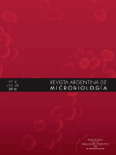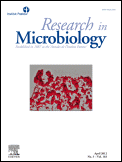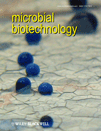
APPLIED MICROBIOLOGY AND BIOTECHNOLOGY
Scope & Guideline
Pioneering research at the intersection of microbiology and innovation.
Introduction
Aims and Scopes
- Microbial Biotechnology:
Research on the utilization of microorganisms for the production of biofuels, biopolymers, enzymes, and other bioproducts. - Environmental Microbiology:
Studies on microbial interactions in natural and engineered ecosystems, including bioremediation and waste management. - Medical Microbiology:
Investigation into microbial pathogens, their mechanisms of infection, and the development of vaccines and antimicrobial agents. - Food Microbiology:
Research on microbial processes in food production, preservation, and safety, including fermentation and spoilage. - Agricultural Microbiology:
Exploration of the role of microbes in soil health, plant growth promotion, and biocontrol of agricultural pests. - Synthetic Biology:
Application of synthetic biology techniques to engineer microbial strains for improved production of desired compounds.
Trending and Emerging
- Microbiome Research:
Investigations into the role of microbiomes in health, disease, and environmental processes are increasingly popular, reflecting a growing interest in the interconnectedness of microbial communities. - CRISPR and Gene Editing Applications:
The utilization of CRISPR technology for genetic engineering in various microorganisms is rapidly expanding, with applications in agriculture, medicine, and industrial biotechnology. - Sustainable Bioprocessing:
Research focused on green technologies and sustainable practices in microbial production processes, emphasizing the use of renewable resources and waste valorization. - Metagenomics and Metabolomics:
There is a growing emphasis on using metagenomic and metabolomic approaches to understand microbial interactions and functions in complex environments. - Biological Control Agents:
The development of microbial biocontrol agents for agriculture and pest management is gaining attention as a sustainable alternative to chemical pesticides. - Synthetic Biology Innovations:
The application of synthetic biology to create novel microbial strains and pathways for the production of high-value compounds is a rapidly emerging area.
Declining or Waning
- Traditional Antibiotic Research:
Although antibiotic resistance remains a concern, the focus on traditional antibiotic discovery has decreased as researchers shift towards alternative therapeutic strategies, such as bacteriophage therapy and antimicrobial peptides. - Basic Microbial Physiology:
Research that solely explores microbial physiology without direct applications or implications in biotechnology is becoming less prevalent, as the journal emphasizes applied research. - Single Microorganism Studies:
Studies focusing on individual microbial species without considering their ecological context or potential applications are declining in favor of more integrative approaches that assess microbial communities. - Laboratory-Scale Studies:
There is a trend away from purely laboratory-scale studies towards research that demonstrates practical applications, scalability, and industrial relevance.
Similar Journals

REVISTA ARGENTINA DE MICROBIOLOGIA
Exploring the frontiers of microbiology and medicine since 1979.REVISTA ARGENTINA DE MICROBIOLOGIA, published by the ASOCIACION ARGENTINA MICROBIOLOGIA, stands as a prominent open-access journal in the field of microbiology and medicine since its establishment in 1979. With an ISSN of 0325-7541 and an E-ISSN of 1851-7617, this journal has paved the way for disseminating high-quality research while enhancing accessibility for academics and practitioners worldwide. The journal has achieved notable rankings, being classified in Q3 for Medicine (miscellaneous) and Q3 for Medical Microbiology in 2023, reflecting its commitment to advancing knowledge in these critical areas. Despite its relatively modest impact factors, it occupies a vital niche in the academic landscape, fostering collaborations and innovative research among experts. With Open Access available since 2013, REVISTA ARGENTINA DE MICROBIOLOGIA not only facilitates widespread distribution of valuable scientific information but also empowers researchers, professionals, and students to stay abreast of the latest findings and developments in microbiology. For those engaged in the evolving realm of microbiology, this journal serves as an essential resource for sharing insights and advancing the scientific community.

JOURNAL OF MICROBIOLOGY AND BIOTECHNOLOGY
Exploring the Synergy of Microbiology and BiotechnologyJOURNAL OF MICROBIOLOGY AND BIOTECHNOLOGY, published by the Korean Society for Microbiology and Biotechnology, is a premier academic journal based in South Korea that has been at the forefront of advancing knowledge in the fields of microbiology, biotechnology, and their applied sciences since its inception in 1991. This journal holds a commendable Q2 quartile ranking in key categories, including Applied Microbiology and Biotechnology, showcasing its significant impact within the academic community. With an emphasis on high-quality, peer-reviewed research, the journal aims to disseminate innovative findings that foster deeper understanding and advancements in microbial and biotechnological sciences. Researchers, professionals, and students utilize this journal to stay informed about contemporary developments and to inspire future investigations. Although it is not an open-access journal, its content is accessible through various academic libraries and databases, providing a vital resource for those engaged in cutting-edge research.

ANNALS OF MICROBIOLOGY
Empowering scholars with vital insights in microbiology.ANNALS OF MICROBIOLOGY is a prestigious journal dedicated to advancing the field of microbiological research, published by BMC, renowned for its commitment to providing open access to vital scientific findings. With its ISSN 1590-4261 and E-ISSN 1869-2044, this journal provides a platform for the dissemination of high-quality research since its inception in 1997. Renowned for its rigorous peer-review process, it has attained a commendable Q2 ranking in the Applied Microbiology and Biotechnology category in 2023, reflecting its significant contributions to the discipline. Positioned within the 67th percentile among its peers in Scopus rankings, ANNALS OF MICROBIOLOGY continues to facilitate the exchange of innovative ideas and methodologies, serving as an essential resource for researchers, professionals, and students alike. The journal covers a broad spectrum of topics, emphasizing the intersection of microbiology with applied sciences, thereby fostering an environment that encourages collaboration and advancement in this vital field. Scholars seeking to stay at the forefront of microbiological studies will find ANNALS OF MICROBIOLOGY an invaluable addition to their academic pursuits.

RESEARCH IN MICROBIOLOGY
Pioneering insights into the microbial universe.Research in Microbiology, published by Elsevier, is a prominent academic journal devoted to advancing the field of microbiology, encompassing a diverse array of topics including immunology, molecular biology, and biochemistry. Established in 1987, the journal has expanded its focus over the years, with a commendable impact factor reflecting its relevance and influence in the scientific community. Although it does not currently offer open access options, Research in Microbiology remains a crucial resource for researchers and professionals seeking to stay abreast of the latest findings and methodologies. The journal holds a respectable Q2 ranking in Medicine (miscellaneous) and a Q3 ranking in both Microbiology and Molecular Biology for 2023, highlighting its position within the scholarly landscape. With its base in France and accessible to a global audience, Research in Microbiology continues to foster scholarly exchange, making it an essential platform for the dissemination of impactful microbiological research.

CRITICAL REVIEWS IN BIOTECHNOLOGY
Exploring Innovative Insights in Applied MicrobiologyCRITICAL REVIEWS IN BIOTECHNOLOGY, published by Taylor & Francis Ltd, stands as a leading journal in the field of biotechnology, consistently recognized for its rigorous peer-reviewed articles that impact the disciplines of Applied Microbiology, Biotechnology, and Medicine. With an impressive Q1 ranking in these categories and a significant influence reflected in its Scopus rankings—placing it within the top 5% of Applied Microbiology and the top 4% of Biotechnology journals—the journal serves as an essential resource for researchers, professionals, and students alike. Launched in 1983 and extending its coverage to encompass groundbreaking findings through 2024, it provides a rich forum for insightful reviews and innovative research that propel the field forward. Though not an Open Access journal, CRITICAL REVIEWS IN BIOTECHNOLOGY remains a vital point of reference for ongoing developments, critical analyses, and emerging trends, making it indispensable for those seeking to stay at the forefront of biotechnological advancements.

Microbial Biotechnology
Pioneering breakthroughs in applied microbiology and biotechnology.Microbial Biotechnology, published by WILEY, stands at the forefront of innovation in the field of applied microbiology and biotechnology, showcasing cutting-edge research and advancements within both academic and industrial contexts. As an Open Access journal since 2012, it ensures that high-quality research is easily accessible to researchers, professionals, and students globally, promoting knowledge sharing and collaboration. With an impressive impact, the journal holds a Q1 ranking in its categories—Applied Microbiology and Biotechnology, Biochemistry, Bioengineering, and Biotechnology—demonstrating its significance in the scientific community. The journal currently boasts a strong Scopus ranking in several relevant disciplines, including a top 10% position in Applied Microbiology and Biotechnology, highlighting its critical role in disseminating influential findings. Designed to foster dialogue and advance technology within the microbial sciences, Microbial Biotechnology is an essential resource for anyone committed to leveraging microbial processes for sustainable and innovative solutions.

FOLIA MICROBIOLOGICA
Illuminating the Path of Microbial Innovation.FOLIA MICROBIOLOGICA is a distinguished academic journal published by SPRINGER, focusing on the intricate realms of microbiology and its contributions to medicine. Since its inception in 1957, the journal has been a vital platform for disseminating pioneering research, addressing contemporary challenges in the field while facilitating discourse among researchers, clinicians, and students alike. With an ISSN of 0015-5632 and an E-ISSN of 1874-9356, FOLIA MICROBIOLOGICA publishes original articles, reviews, and critical insights that span not only traditional microbiological studies but also innovative applications in immunology and biotechnology. The journal is categorized within the esteemed Q2 tier in Medicine (Miscellaneous) and holds a Q3 rating in Microbiology as of 2023, reflecting its significant impact and relevance in the scientific community. Although it does not currently offer open access, it remains a respected resource, enabling professionals and students to keep abreast of advancements from its base in the Netherlands. With a strong commitment to quality and rigorous peer-review, FOLIA MICROBIOLOGICA serves as an essential repository of knowledge, fostering the next generation of microbiologists and medical practitioners.

JOURNAL OF MICROBIOLOGY
Connecting global minds in the realm of microbiology.JOURNAL OF MICROBIOLOGY, published by the Microbiological Society Korea, is a prestigious peer-reviewed journal dedicated to the advancement of knowledge in the fields of microbiology, applied microbiology, and biotechnology. Established in 1996, this journal serves as a vital platform for researchers and professionals from around the globe to disseminate their findings and engage in multidisciplinary discussions pertaining to microbial sciences. With an H-index that reflects its impact, the journal holds a commendable Q2 ranking in key categories including Applied Microbiology and Biotechnology, as well as Medicine (Miscellaneous), which underscores its significance in the academic community. Despite being a subscription-based journal, the JOURNAL OF MICROBIOLOGY aims to contribute to the understanding of microbial processes and their applications, facilitating advancements that are essential in health, industry, and environmental sciences. Researchers, students, and practitioners are encouraged to explore this rich resource for the latest research and trends in microbiology.

ARCHIVES OF MICROBIOLOGY
Advancing the Frontiers of Microbial ScienceThe Archives of Microbiology, published by Springer, is a reputable journal in the field of microbiology, serving as a vital platform for the dissemination of groundbreaking research and critical reviews since its inception in 1974. With an ISSN of 0302-8933 and an E-ISSN of 1432-072X, this journal operates out of Germany and maintains a global reach, promoting high-quality scholarship across multiple disciplines, including biochemistry, genetics, and molecular biology, as evidenced by its Q2 ranking in Medicine (miscellaneous) and consistent Q3 placements in other categories in 2023. Although the journal does not offer open access options, its rigorous peer-review process ensures that published articles are of the highest standard, making it an essential resource for researchers, professionals, and students keen on advancing their understanding of microbial sciences. As the journal converges toward 2024, it remains committed to fostering innovative microbiological research and facilitating interdisciplinary dialogue within the scientific community.

INDIAN JOURNAL OF MICROBIOLOGY
Innovating Solutions Through Microbial ResearchINDIAN JOURNAL OF MICROBIOLOGY, published by Springer, serves as a vital platform for the dissemination of cutting-edge research in the field of microbiology. With an ISSN of 0046-8991 and an E-ISSN of 0973-7715, this esteemed journal invites contributions that span various disciplines within microbiology, encompassing both fundamental studies and applied research that can impact health, environment, and industry. Recognized in the Q3 category in Microbiology for 2023, and ranking #80 out of 182 in Scopus’ Microbiology category, it reflects its commitment to quality and significance in the academic community. Authors and researchers benefit from the journal's comprehensive review process, which enhances the visibility and reach of their work. While no open access options are currently offered, the INDIAN JOURNAL OF MICROBIOLOGY remains a premier choice for those aiming to contribute to the ongoing dialogue in microbiological studies, ensuring that knowledge continues to evolve and thrive.